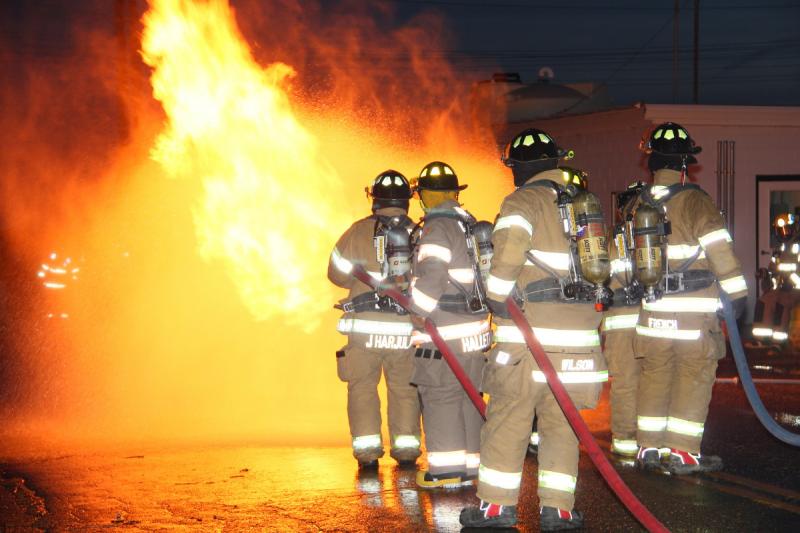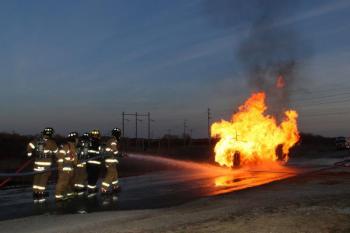Propane fire training in Rockland helps South Thomaston’s up-and-coming firefighters
ROCKLAND (Updated April 7) — Monday night was training night for firefighters in Rockland, where the gathering place was the Transfer Station and the drill was extinguishing propane fires. The majority of Maine’s municipal fire departments are volunteer, and it’s not only a commitment to answer calls but it’s a commitment to be trained to do it safely and efficiently.
About 20 firefighters participated in the training put on by Rockland Fire Department on April 3, which was held to assist South Thomaston’s rookie firefighters in completing their Firefighter 1 and 2 classes.
South Thomas Fire Chief Bryan Calderwood said, “South Thomaston Fire Department has been working in-house for the last couple of years to get firefighters their Frefighter 1 and 2 certification, which is above and beyond the state requirements. These eight or nine firefighters have put a lot of time in, and the Class B burns was their last hand’s on task prior to taking their written and practical end tests.”
In addition to South Thomaston, firefighters from Owls Head also participated in the Class B burn (propane).Calderwood said that South Thomaston Fire Department instructors were on hand that night to assist if needed, but that Rockland Fire Department instructors conducted the class to give South Thomaston’s firefighters additional training by having instructors they were not familiar with.
The Class B burns are designed to simulate a propane fire that has occurred, and is impinging on the container it is held in, according to Rockland Fire Chief Chris Whytock.
“Propane fires bring a few different challenges,” said Whytock. “First off, some situations don't allow for extinguishment of these fires. Sometimes all you can do is cool the tank with water streams and let the fire burn itself out. Second, if you can get to a shut-off valve and the tank hasn't been compromised, shutting the gas off can be done with water protection provided by the hand lines you see in the pictures.”
Whytock said the training fires also give the rookies a valuable opportunity to get close to fire, but have it done in a safe environment.
“There are emergency shut-offs and back-up lines in case something doesn't go as planned,” said Whytock.
In some cases, a single firefighter can handle holding a line of pressurized water streaming out, but the need for three to four firefighters on a hand line comes down to ease of mobility. The lines are heavy when charged with water, and hard to move without help, said Whytock, referring again to the photos.
“In fact, the nozzle firefighter should be the one doing the least amount of work. The members behind the nozzleman should do the bulk of the work leaving the nozzleman to control and extinguish the fire,” said Whytock.
Calderwood said the eight or nine South Thomaston firefighters are slated to take their written end tests on April 10 in South Thomaston, and their practical end test a month later, on May 20, in Brunswick. With successful completion and passing the end tests, South Thomaston Fire Department will have 15 members with Firefighter 1 and 2 certification, out of its total 18 members.
I want to also thank Chief Whytock for allowing his instructors, Asst. Chief Ken Elwell, Rodney Gibbs and Ruston Barnard, to conduct the hands-on training for us. Also to Owls Head for sending some members to get the training as well,” said Calderwood. “Joint training with our immediate mutual aid departments is very vital to our operations more now, than ever before.”
Calderwood also thanked Dead River in Rockland, which donated the four 100-pound propane cylinders, and delivered and picked up the tanks for fire departments to train with.
Looking forward to eventually heading into grilling season, (yes, it will happen), Whytock recommends inspecting grills for safe operations. Make sure the gas lines aren't weathered or cracked. Replace any parts to the manufacture’s recommendations and when you are done grilling, make sure the propane bottle is shut off before storing. Also, store any propane bottles outside of structures, in case of a leaky valve.
Editor’s Note: This story has been edited and updated to include information from South Thomaston Fire Chief Bryan Calderwood.
Reach Editorial Director Holly S. Edwards at hollyedwards@penbaypilot.com; 207-706-6655.


























